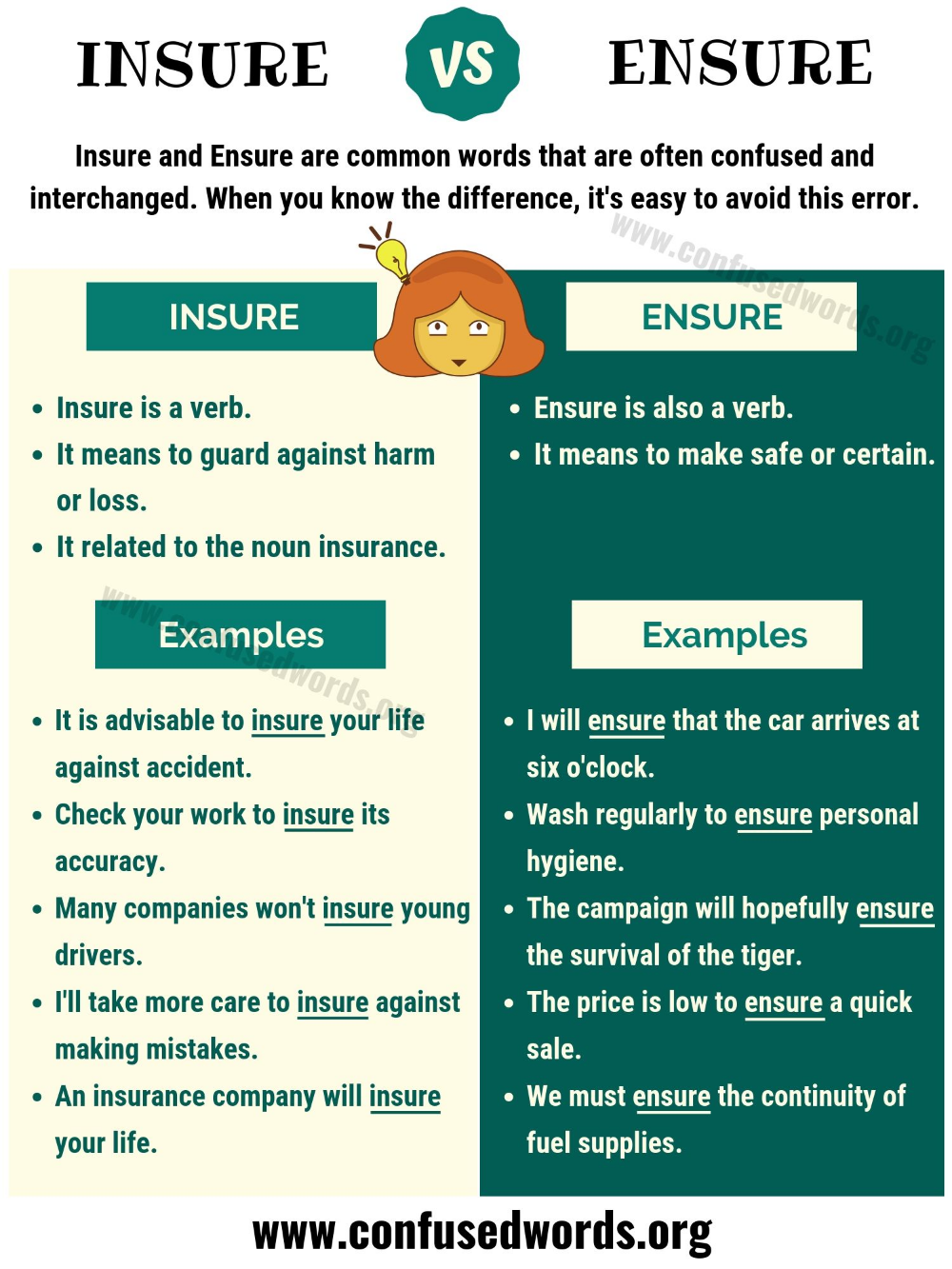Insure Meaning

The term insure is a verb that holds significant importance in the world of finance and risk management. It refers to the act of obtaining insurance coverage, a fundamental concept that has revolutionized the way individuals and businesses protect themselves against various uncertainties and potential financial losses. Understanding the meaning and implications of insuring is crucial for anyone seeking to navigate the complex landscape of financial security and risk mitigation.
The Concept of Insurance

Insurance, at its core, is a financial arrangement designed to provide protection and financial compensation in the event of specific incidents or losses. It operates on the principle of risk transfer, allowing individuals or entities to transfer the financial burden of unforeseen events to an insurance company. By paying regular premiums, policyholders gain access to a safety net that covers a range of potential risks, from health emergencies to property damage and liability claims.
The concept of insurance has a long history, dating back to ancient civilizations where early forms of risk-sharing arrangements were made to protect against losses from trade and natural disasters. Over time, insurance evolved into a sophisticated industry, offering a wide array of policies tailored to specific needs and industries. Today, insurance is an integral part of modern society, playing a vital role in promoting economic stability and providing individuals with the peace of mind that comes with financial security.
The Act of Insuring

When an individual or business decides to insure something, they are essentially entering into a contractual agreement with an insurance provider. This agreement, known as an insurance policy, outlines the terms and conditions of the coverage, including the scope of risks covered, the amount of compensation, and the responsibilities of both parties.
The process of insuring typically involves the following steps:
- Identifying the Risk: The first step is to recognize and understand the potential risks that could impact the individual or business. This could include health issues, property damage, liability concerns, or other specific risks relevant to the insured party.
- Researching Insurance Options: With a clear understanding of the risks, the next step is to explore the available insurance options. This involves comparing different policies, providers, and coverage levels to find the best fit for the individual's or business's needs and budget.
- Applying for Insurance: Once a suitable insurance policy is identified, the insured party submits an application to the insurance provider. This application typically requires detailed information about the insured party, the risks being insured, and any relevant personal or business details.
- Underwriting and Policy Issuance: The insurance provider's underwriting department assesses the application, evaluating the risk and determining the terms of the policy. If approved, the provider issues an insurance policy, which outlines the coverage, premiums, and any exclusions or limitations.
- Payment of Premiums: To maintain the insurance coverage, the insured party is required to pay regular premiums to the insurance provider. These premiums are typically paid monthly, quarterly, or annually, depending on the policy terms.
- Filing Claims: In the event of an insured incident or loss, the insured party files a claim with the insurance provider. The provider then assesses the claim, verifies the validity of the loss, and provides compensation as outlined in the policy.
Types of Insurance
Insurance policies come in various forms, each designed to address specific risks and needs. Some common types of insurance include:
- Health Insurance: Provides coverage for medical expenses, including doctor visits, hospital stays, prescription drugs, and sometimes preventive care.
- Property Insurance: Covers damage or loss to personal or business property, such as homes, vehicles, and commercial buildings. This includes protection against fires, natural disasters, theft, and other perils.
- Life Insurance: Offers financial protection to beneficiaries in the event of the insured individual's death. It can provide a lump-sum payment or ongoing income to help cover expenses and maintain the standard of living for loved ones.
- Auto Insurance: Mandated by law in many countries, auto insurance provides coverage for vehicle-related incidents, including accidents, theft, and damage. It typically includes liability coverage, which protects the insured against claims for bodily injury or property damage caused to others.
- Business Insurance: A broad category that includes various policies tailored to the unique needs of businesses. This can include coverage for property damage, liability, business interruption, and specialized risks specific to certain industries.
- Travel Insurance: Provides coverage for unexpected events during travel, such as trip cancellations, medical emergencies, lost luggage, and other travel-related incidents.
- Pet Insurance: Designed to cover veterinary costs and medical treatments for pets, offering financial protection against unexpected health issues.
The Benefits of Insuring
Insuring oneself or one's assets offers numerous advantages, including:
- Financial Protection: Insurance provides a safety net against financial losses, ensuring that individuals and businesses can recover from unforeseen events without facing catastrophic financial consequences.
- Peace of Mind: Knowing that potential risks are covered by insurance can reduce anxiety and stress, allowing individuals to focus on their daily lives and businesses to focus on growth and innovation.
- Risk Management: Insurance enables individuals and businesses to proactively manage risks, helping them prepare for and mitigate potential losses. This includes identifying vulnerabilities and taking steps to reduce the likelihood of incidents.
- Legal Compliance: In many cases, insurance is a legal requirement, ensuring that individuals and businesses meet their obligations and protect others from financial harm.
- Enhanced Creditworthiness: Having insurance coverage can improve an individual's or business's creditworthiness, as it demonstrates financial responsibility and the ability to manage risks.
Challenges and Considerations

While insurance offers significant benefits, there are also challenges and considerations to keep in mind:
- Cost: Insurance policies can be expensive, especially for high-risk individuals or businesses. The cost of premiums can be a significant financial burden, particularly for those on a tight budget.
- Exclusions and Limitations: Insurance policies often come with exclusions and limitations, which specify what is not covered. It's crucial to carefully review the policy to understand the scope of coverage and any potential gaps.
- Claim Denials: Insurance providers may deny claims if the incident is not covered by the policy or if there is evidence of fraud or misrepresentation. Understanding the claim process and being prepared with necessary documentation can help avoid denials.
- Regulatory Compliance: The insurance industry is heavily regulated, and policyholders must adhere to specific rules and guidelines. Non-compliance can lead to penalties and legal issues.
- Changing Needs: Insurance needs can evolve over time as personal or business circumstances change. Regularly reviewing and updating insurance policies ensures that coverage remains adequate and aligned with current needs.
The Future of Insurance
The insurance industry is undergoing significant transformation driven by technological advancements and changing consumer expectations. Here are some key trends shaping the future of insurance:
- Digitalization: The rise of digital technologies has led to the development of online insurance platforms, mobile apps, and telematics, making it easier and more convenient for consumers to access and manage insurance policies.
- Data Analytics: Insurance providers are leveraging advanced data analytics and artificial intelligence to better understand risks and personalize insurance offerings. This allows for more accurate risk assessment and targeted insurance solutions.
- Parametric Insurance: This innovative approach to insurance pays out based on predefined parameters, such as weather events or natural disasters, rather than waiting for individual claims. It offers faster payouts and simplifies the claims process.
- Insurtech Innovations: Insurtech startups are disrupting the traditional insurance model with innovative solutions, including peer-to-peer insurance, on-demand insurance, and blockchain-based insurance platforms.
- Wellness and Prevention: The focus on health and wellness is driving the development of insurance products that encourage healthy behaviors and provide incentives for disease prevention. This includes wellness programs, wearables, and personalized health plans.
As the insurance industry continues to evolve, individuals and businesses must stay informed about the latest developments and adapt their insurance strategies accordingly. By staying proactive and educated, policyholders can ensure they have the right coverage to protect their financial well-being and mitigate risks effectively.
Frequently Asked Questions
What is the difference between insurance and assurance?
+Insurance and assurance are often used interchangeably, but they have distinct meanings. Insurance typically refers to protecting against specific risks or events, while assurance focuses on guaranteeing a benefit, such as a life insurance policy that provides a death benefit to beneficiaries.
Is it mandatory to have insurance?
+While not all types of insurance are mandatory, certain types are required by law. For example, auto insurance is mandatory in many countries, and businesses may be required to have specific insurance coverage to comply with legal and regulatory obligations.
How do insurance premiums work?
+Insurance premiums are the regular payments made by policyholders to maintain their insurance coverage. The amount of the premium is determined by various factors, including the type of insurance, the level of coverage, the insured’s risk profile, and the insurance provider’s pricing strategy.
What happens if I don’t pay my insurance premiums?
+If you fail to pay your insurance premiums, your insurance coverage may be cancelled or lapsed. This means that you will no longer be protected by the insurance policy, and any claims made during the lapse will not be covered. It’s important to stay up-to-date with premium payments to maintain continuous coverage.
How do I choose the right insurance provider and policy?
+Choosing the right insurance provider and policy involves several factors. Consider your specific needs, research different providers and their reputations, compare policy coverage and premiums, and seek recommendations from trusted sources. It’s also beneficial to consult with an insurance broker or financial advisor who can guide you through the process.



